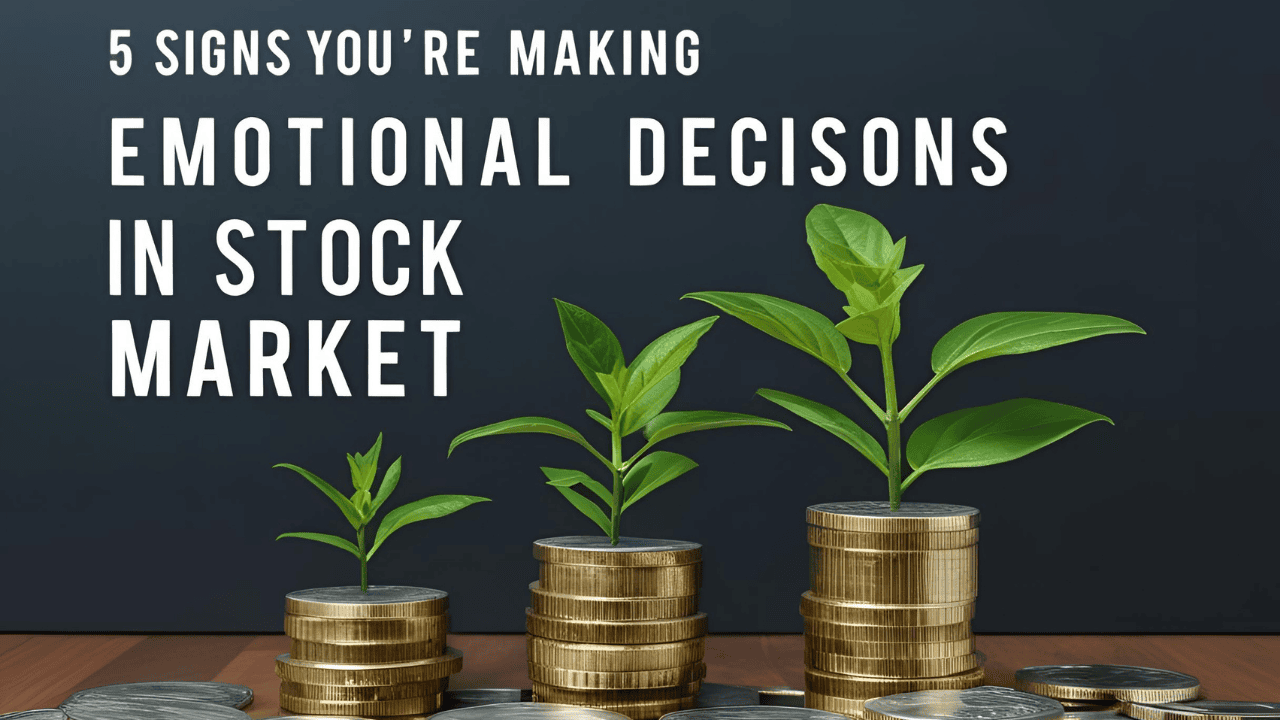Earning money in the stock market is not rocket science, but if you make decisions based on emotions, then losses are unavoidable. Many people think that they are smart investors, but their decisions are actually emotional. And the stock market does not work on the basis of emotions.
In this article, we will talk about 5 such signs which tell that you too may be taking emotional decisions in the stock market. If you find any of these signs in your investing behavior, then understand that the time has come to review your strategy.
1. You Sell In Panic When the Market Falls
This is the most common emotional reaction. As the market falls, you feel that everything is over and you sell your shares. This decision is based on fear, not logic.
Example:
When the market crashed during COVID-19 in 2020, many people sold their mutual funds and shares in panic. And after a few months, the market touched an all-time new high.
Solution:
If your investments are for the long-term, then do not do panic selling at all. Market falling is normal. Keep a long-term view and focus on your goals.
2. You Buy Shares Due to FOMO (Fear of Missing Out)
When a stock or sector suddenly comes into the news and everyone is investing in it, then you feel that if you do not buy it now, then you will lose the chance. This is called FOMO.
Example:
People invested money in cryptocurrency or meme stocks like GameStop without doing any research just because everyone was doing it.
Solution:
Do your own research before investing in any stock or asset. Do not make decisions based only on what other people are doing.
3. You Do Not Accept Your Mistakes
An emotional investor often does not accept his mistakes. If a stock is falling, he buys more of it, thinking “it will definitely rise now”. This increases the loss.
Example:
If you bought a stock for $100 and it became $60, and you are investing more money in it without any reason just because you don’t believe that you can be wrong.
Solution:
Accept your investing mistakes. Every investor makes mistakes, but it is important to learn from them. Once you start accepting your mistakes, then you will be able to avoid repeating the same mistakes. So, no matter if you are in the field of investing, you will become a better person if you start accepting your mistakes and avoid making them again.
4. You Check Your Portfolio Every Day
If you check your portfolio daily or several times a day, it means you are emotionally attached to your investments. The market goes up and down every day, and tracking it all the time only increases stress.
Example:
If you get tensed or happy at every small movement, then investing is affecting your mental health. Being healthy is way more important than generating profits. So, of course, make better decisions and work hard, but without destroying your health.
Solution:
If you have invested in the right way, then checking it weekly or monthly is enough. Too much obsession leads to emotional decisions. Please avoid checking your report all the time.
5. You Try To Time The Market
Many people start thinking all the time, “When will the market bottom?” or “It is at the top now, should I sell?”. This is also an emotional approach in which you are making decisions based on fear and greed.
Example:
If you are thinking on every dip that this is the last chance and on every rally you feel that now there will be a crash, then you are becoming emotional due to market timing.
Solution:
Use SIP (Stematic Investment Plan) and long-term strategy. Consistent investing is more important than market timing.
If you are interested in investing for the long term, then our article – Lumpsum vs SIP will help you a lot.
Disadvantages of Emotional Investing
- Short-term losses
- Missed long-term opportunities
- Mental stress
- Financial instability
When decisions are not logical, the portfolio suffers. You move away from your future goals.
Build Emotional Intelligence for Better Investing

Meaning of emotional intelligence:
- Recognizing your emotions
- Understanding the emotions of others
- Controlling impulses
- Creating a long-term vision
These qualities are not only useful in personal life but also in investing
However, you can learn more about building emotional intelligence after reading our article – Emotional Intelligence in the Stock Market: The Hidden Skill Every Investor Needs
How to become an emotionally strong investor?
1. Keep your goals clear
If you know the goal for which you have invested, then you will easily be saved from distraction.
2. Continue SIPs
Whether the market is up or down, regular investing teaches discipline and keeps emotions under control.
3. Take advice from a financial advisor
Sometimes, it is best to talk to an expert, especially when you are feeling confused.
4. Watch the market in the long term
You should not fear from short-term volatility. History has shown that the market grows in the long term.
5. Maintain a journal
Write down your decisions and track them. This will help you understand when and why you became emotional.
FAQs
Q1: What is the biggest disadvantage of emotional investing?
Emotional investing prevents you from achieving your long-term goals and makes you face unnecessary losses.
Q2: How to control emotions when the market is falling?
Remember your goals, maintain an emergency fund and study past market recoveries.
Q3: Is it possible to avoid emotional investing?
Yes, with a little patience and discipline, you can control emotions to a great extent.
Q4: Is it necessary to get professional help?
If you feel that you are not able to handle your investments properly, then yes, an advisor can help.
Final Thoughts
To earn money in the stock market, you need not just knowledge but also a strong mindset. Emotions are a part of everyone’s life, but if they take too much control while investing, it causes loss.
If you recognize these 5 Signs You’re Making Emotional Decisions in the Stock Market, then work against them, and you can make your investing journey stable and successful.
So next time, whenever you have to make a decision, take a step back, think, and then take action. The market rewards only those investors in the long term who are moving ahead with patience and planning.
